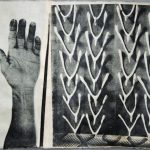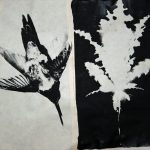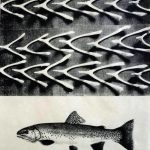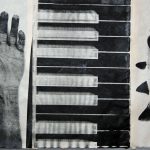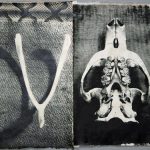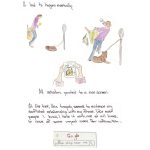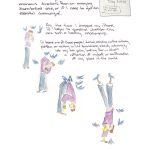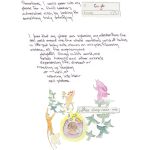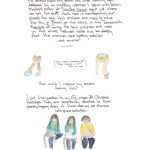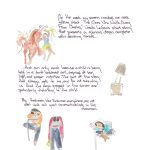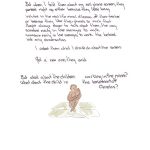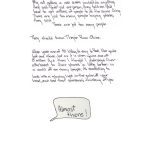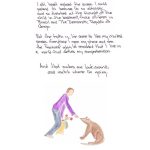Lying in my sleeping bag, I thought of three things: black eyes, round asses, and God. The boys from my youth group were stuffed in the storage room of a Protestant church. The girls were isolated down the hall. Sleep was impossible, but on the first night of our divine mission my restlessness was given a reprieve. Our leader, Geri, burst in screeching with an issue of Cosmo squashed in her fist.
Geri had to have been in her early twenties, but to us kids, she carried all the wisdom of the Lord. She routinely searched our belongings, and one of the girls had been cavalier enough to buy a secular—satanic—magazine at a pit stop on our bus ride from Sarasota to Miami. The girl cried outside in the hall.
“I want to send her home,” Geri said, “but it’s too late for that.” Her eyes welled up. “We’re here for a very important reason. We can’t let anything separate us from God. We’re here for Him.”
Geri had little breakdowns like that all the time. She’d shed tears for us kids whenever she smoked a cigarette: “I know with every puff Jesus suffers longer.”
I made sure I wasn’t exposing myself and walked over to her. “You would really send her back?”
She put her hand on my shoulder. This aroused me. As much as I was afraid of her, she gave me more attention than any of the girls in my middle school.
“Yes, Brett.” Her hair was messy and gold. “Don’t you realize the promise we made?”
Oh, I made a promise all right. I promised to give up everything for God: my possessions, dreams, thoughts—my goddamn identity. I was part of something larger than myself, or some bullshit like that. In order to finance the ugly school bus we took from Sarasota to Miami, I spent all summer mowing yards and raking leaves. I had entered a black hole for Jesus, and I was charged with saving pagan souls from it. That was our mission.
“I’ll pray this doesn’t happen again,” she said.
Everyone thanked her, not knowing what else to do, and then we returned to our polyester masturbation tombs. I wrapped up tight, touching my groin, but not loud enough for anyone to hear. The thick sleeping bag warmed my twig and acorns. Closing my eyes, I tugged my member and thought of Geri, but my rodeo was silent. I’d learned another kind of stealth at school. To prevent a fist from crashing into the back of my head, I studied my tormentors’ routines, let them walk down the hall before I did. I used the bathroom during class instead of on breaks to keep my head out of the toilet. I was a ninja at avoiding bullies, just not defending myself from them.
This was why I made my promise to Jesus. I would save souls in exchange for him saving me. Geri had seemed a strange instrument for his salvation, but I attempted not to question God. As long as the beatings stopped, the Lord could ferry Daffy Duck down from heaven to save me.
The next day we met the Miami pastor. He bounced in his chair and yanked tiny, green things from his beard. “I was a pimp,” he began. “I sold women. I sold myself. I worked as an enforcer sometimes.” He shook his head. “It’s not pleasant, hurting people.” After wrenching himself from the chair, he trudged back and forth and told us the tale of how he found Jesus.
“My wife and I were watching TV. The Preacher opened our hearts. Now I live for God.”
That’s right. A televangelist convinced him to love Jesus (and give up his money). This seemed completely normal to me at the time. God works in mysterious ways, they said. I worked all summer, so I could be shipped to Miami and sleep on the floor of a church whose pastor was a pimp.
This pimp was a hell of lot preferable to my best friend back home. A few months prior my best friend had punched me in the face during a laser light show. I disagreed with him about music, and so I lost the skin under my eyes. It was minor compared to what I was accustomed to, so I still slept over at his place that weekend. At least he didn’t beat me up all the time.
After the pastor finished, we handed out pamphlets in neighborhoods with windows shielded by iron bars. People either cussed us out or shared their mutual love of Jesus–ultimately accomplishing nothing. It was either A) “I love Jesus TOO” or B) “Fuck off, children.”
There was one miracle, however. Geri wore tiny little silk shorts that showed off her pumpkin-sized booty. It was that day I discovered my sexual orientation: big-booty-o-sexual. I wasn’t Catholic, but my personal Protestantism had its only holy trinity: the father, the son, and Sir-Mix-a-Lot.
Geri turned to me. “We’re saving a lot of lives today, Brett.”
“No one’s really changed their mind.”
She gripped my wrists. “God knows what he’s doing.”
I nodded. Her words calmed me, and I really believed them. God was looking down on us, admiring his chosen instruments doing his work. And how could I not be spellbound by this delusion? It was a relief to be away from the kids back home dragging me across the baseball field by the legs. No one flicked my ears from the desk behind me. No one sucker-punched me for my lunch money. I didn’t have to endure a room full of kids laughing at my gym attire because someone broke into my locker during P.E. and stole my clothes. Sure, people slammed their doors in our faces, but it was heavenly compared to physical assault. If following Geri’s bouncing cinnamon buns under the light of God wasn’t deliverance, I didn’t know what was.
After wasting paper all day, our traveling circus lingered at a basketball court. Geri was still riled up like a crack fiend, but our other youth group leader, a self-important prick named Chuck, decided we needed a rest. Unlike Geri, Chuck had no redeeming qualities. Unless you count being old and rich as redeeming. He never let up on me. Every night, he barked at me about my untidy sleeping bag or lectured me about the evils of loose women and The Simpsons. His favorite topic of conversation was about how much money he donated to our church back home. “Kept it alive,” he said.
On the court, a boy rimmed out a shot and said, “Shit.” Chuck whispered “Shoot” to make sure our ears hadn’t been soiled, which made me want to shout “Eat a dick” into his tender lobes. Instead I read through the pamphlet for the twentieth time. The kid cursed again, and Chuck shook his head like he just heard about a baby getting run over by a truck.
On the way back to the labor camp, we passed a voodoo shop. Well, in retrospect it was probably just a store that sold bongs and Ouija boards, but Chuck and Geri steered us away from it like it was Satan’s private sex dungeon. I broke rank and ran over to it.
“Brett, stop. It’s too dangerous,” Chuck cried.
I didn’t look back. I’d made no progress knocking on doors, and if I could save just one soul from the fiery pits of hell, I’d march right into the heart of the devil’s ballsack, and all the schoolyard beatings would be worth it. Chuck could swallow his words along with his fluffy mustache for all I cared. I marched into the shop and tossed the pamphlet on the counter in front of the clerk.
The guy behind the counter eyeballed it, and then he winced at me for a few seconds before hissing, “Out… OUT.”
Back at the church, Geri, Chuck, and the pastor went at me three-on-one.
“You need to listen when we tell you not to do something,” said Chuck.
“This isn’t why we came here,” said Geri.
The pastor quivered, his face paling. “There are some places too dangerous to go, son. Demons stalk their walls.”
I looked at Geri. “Isn’t this what we came here for?”
She walked over to a table and sat down.
The pastor continued. “There is war between light and darkness. We can save some from the darkness, but we can’t enter it.”
I walked over to Geri. “Why shouldn’t we try to save everyone?”
She mumbled something and shook her head.
“This isn’t why we came here,” she repeated.
“Then why did we then?” I asked.
“Don’t talk back to adults,” said Chuck.
The pastor paced around. “Demons,” he said. “Darkness. War.”
I wouldn’t leave Geri. “Shouldn’t we try to save, you know, everybody?”
She stood up from the table and said, “We don’t know God’s plan,” before leaving the room.
“Brett, I told you—”
“Yes, Chuck. You’re right.” I whispered cock face under my breath.
As I walked back to my sleeping quarters, the pastor kept on. “Devil’s home. Can’t cross the line.”
This was the first time Geri had ever not known God’s plan. She was my constant in deciphering what the Almighty wanted from us.
My first memory of her was when I was twelve. She supervised children making crafts for a pageant at my church. As I cut through red construction paper, she asked me if I was going to heaven.
This struck me as a silly question. I hadn’t murdered anyone, and hell was for really bad people.
“Actually, real Christians ask Jesus to come into their hearts,” she told me.
“And ones that don’t go to hell?”
“You can’t enter God’s kingdom without asking Him to come into your heart.”
That a particular phrase must be uttered, like a password, to get into heaven short-circuited my radio to Jesus. I was an adolescent, and she spoke like someone who knew shit, so I bought it.
Jesus, please come into my heart.
I said the phrase. Jesus, please come into my heart. Jesus, please come into my heart. Jesus, please come into my heart. Was I glad to have that task scratched off my list! I imagined hell as a giant desert with people burning on stakes as a minotaur poked them with pitchforks. That I might fry there for all eternity for not saying the right phrase made my bladder hurt.
After I became accustomed to being in the saying-the-right-phrase club, I annoyed my friends into saying it too. Do you accept Jesus into your heart? You have to accept him into your heart.
But I didn’t really know what that meant. Not exactly.
With the beatings I took from other kids in school, day after day, year after year, the main thing that brought me any relief was biking over to the local comic book shop every month and reading the latest issue about the mutant team. I didn’t have many friends, especially ones I could count on, but I did have my comic books. One day, I snuck an X-Men comic in at youth group. Not wanting to be scolded, I hid it in my jeans under my t-shirt.
Spotting a lump in my jeans, Geri loomed over me.
“Brett, what did you bring into this holy place?”
“Nothing.”
“It looks like you have something there. Hand it over.”
I didn’t budge.
Geri leaned close. “You got the devil in your pants. Don’t ya?” Her hot breath made the hairs on my arms rise.
“What?”
“The devil. You got the devil in your pants.” She glared at the lump in my pants as a smaller lump grew beside it.
I shook my head no.
“Give it over.” She extended a firm hand.
Taking a last look at Wolverine on the cover, I relinquished it. “It’s just a comic book,” I said.
She scanned the pages with fire in her eyes. “You shouldn’t have brought this here. I’m going to store it away for safekeeping.”
“You’re not going to give it back?” My neck tightened up.
“No. You don’t need things that take you away from God.”
“It doesn’t.”
She grinned. “Then why can’t you give it up?”
“Because. Because I love it.”
“Exactly,” she retorted and walked off with my comic book.
I followed her. “You can’t take that from me.”
“You lost it the second you brought it here.”
My body trembled. “You can’t take it.”
“If you won’t sacrifice all your earthly possessions to Jesus then you haven’t really taken him into your heart.”
“So, I’ll go to hell if I don’t stop reading comics?”
She became solemn. “Anyone who doesn’t fully give themselves to God will go to hell.”
All I had were those comics.
“Give it back or I’ll leave youth group forever.”
She laughed. “Don’t be silly, Brett.”
“I mean it.”
“We’ll see about that.”
When I left that night, I thought I’d never return. A few weeks later, however, my rebellious spirit broke, and I was back listening to diatribes about the evils of rap music and Bill Clinton. I read comics less often, and when I did allow myself to sin a little I couldn’t indulge my superhero thirst without pangs of guilt sullying the experience.
On our mission trip our main targets for convincing others to say the magical phrase ended up being the children of parents who couldn’t afford daycare. The little nuggets were left for us to attend to at the church. One boy in particular stood out to me. He had dark bruises on his arms and didn’t play with the other children. As I tried to get him to smile, an alarm blared inside me. When you’ve been through enough abuse, it’s easy to recognize it.
The other kids in the youth group either didn’t notice or didn’t care. They were happy preaching that Jesus was Lord and savior to kids, many who were Hispanic and could barely speak a lick of English. When it was clear I couldn’t save the bruised kid’s skin, I tried to save his soul. I had no such luck. He wouldn’t say a word. The other youth members managed to get their prospective clients to say the phrase. The kids had no idea what they were saying, but that didn’t stop the youth group from celebrating like heroes.
Later that night, we held hands in a prayer circle. Geri wasted no time lamenting our wickedness. “I’m so sorry, God,” she said. “I’m sorry for all of our sinning. We don’t deserve you, but we will be your instrument.” It wasn’t long before the tears were flowing.
Another teenager in the youth group, Damian, leaned over to me. “How broken is your instrument?” he asked.
I smothered laughter as Geri wailed on.
“Help us, Lord. Use these children,” she said with tears plopping down her face. “Now sing, everyone.” She started for us: “Our God—” she sang through her snivels, “is an awesome God—.” Snot poured down her chin. “He reigns”—I closed my eyes— “from Heaven above” —she crooned, “with wisdom, power, and love—.”
Damian snickered, but I kept my head down.
“Our God—is an awesome God.”
Damian patted me on the shoulder. I opened my eyes as she repeated the refrain, and a long thread of snot swung back and forth from her nose. It almost reached her legs, but the booger didn’t break.
She returned to prayer. “Jesus, help us. Guide us.” The snot swung even more precariously.
I bit my hand to keep myself from laughing, but when I looked over at Damian we both lost it. Our laughter didn’t stop her, though. She finished her prayer, snot dangling from her nose like a limp dick.
After waking from another night tickling my balls so quietly you’d think I was tunneling my way out of prison, Geri invited me to make crafts with her. She wanted to decorate the church. I agreed, but the forbidden nature of the voodoo shop still bothered me.
“I’m proud how much you’ve grown as a Christian,” she said.
“You think so?”
“You’ve come a long way.” She stared at me intensely.
“Have I?”
She put her hand on my shoulder. “I know it’s hard. Maybe when we get back to Sarasota you can come over and have a beer sometime.”
I didn’t know how to respond to this offer.
“We can talk about whatever you want,” she said.
A numbness spread through my chest. “What would you do if you were given proof that there was no God?”
Cocking her head to the side, she said, “But that’s impossible because God is real.”
“Yeah,” I said, “but what if there was proof that He didn’t exist?”
She gazed up at the ceiling and shook her head. “I don’t know. I can’t imagine my life without God. I guess if that happened, I’d just believe in Him anyway.”
I sleepwalked through the last two days of converting Miami’s doomed sinners into Christians. By that point we had all the children standing on a stage together and repeating the line in unison: I accept Jesus into my heart. I accept Jesus into my heart. I accept Jesus into my heart.
While the rest of the youth group beamed and said things like “It’s a miracle” and “Praise Jesus,” I just sat in silence watching the bruised boy. He remained silent. The image of him is still seared into my memory: dirty hair and bruised eyes. On the last day, I approached Geri.
“I know something bad is happening to him,” I told her.
“Just focus on saving him,” she said.
I couldn’t save him or Geri. I couldn’t even save myself.
